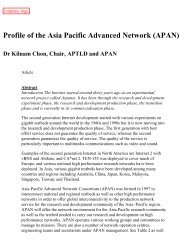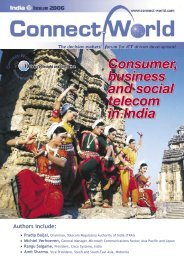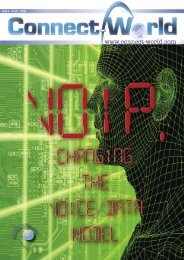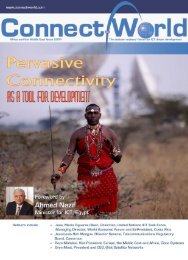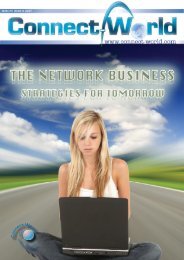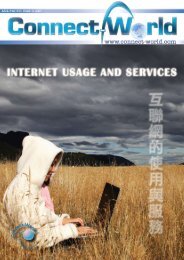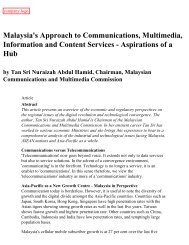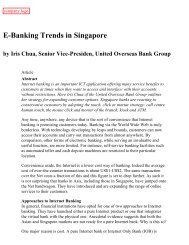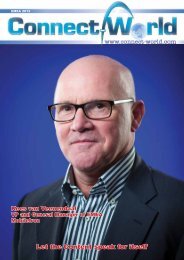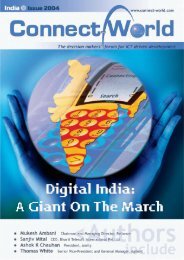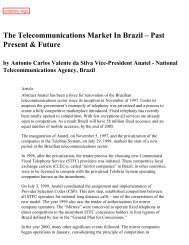Contents - Connect-World
Contents - Connect-World
Contents - Connect-World
Create successful ePaper yourself
Turn your PDF publications into a flip-book with our unique Google optimized e-Paper software.
CONNECTIONS, CONEXES, CONEXINES, CONNEXIONS<br />
The information and communication technology sector is entering what promises to be a<br />
period of steady and sustained growth. The sector will not return to the wild predot.com<br />
bust days. Those days are gone and the sector, the sector’s very structure, is different.<br />
The driving forces have changed, the economics have changed, the technology<br />
has changed and the market, what the market expects, has changed. The eternal more,<br />
better, cheaper, are still market drivers, but technologies long recognised as disruptive<br />
are now moving to the forefront and changing the nature of the market. Other, newer,<br />
technological contenders are clamouring for attention. Still, irrational exuberance<br />
especially when spun by sales and marketingis hard to cut through. Hype and enthusiasm<br />
sometimes mask real promises, but, then again, sometimes not.<br />
Fredric J Morris<br />
Editor-In-Chief<br />
Global Development—Ambassador Dr Makarim Wibisono of the Republic of<br />
Indonesia, a member of the UN-ICT Task Force and the former President of the United<br />
Nations Economic and Social Council, argues persuasively that, although ICTs boost economic<br />
and social development, combat poverty, promote equality and gender empowerment,<br />
developing countries trying to implement ICTs have often failed due to the quality<br />
of the available human resources.<br />
National Development—The Honourable Dato Seri Dr Lim Keng Yaik, Malaysias<br />
Minister of Energy, Water and Communications, feels that Malaysia needs to build its<br />
ITC infrastructure and increase the effective use of information technology to transform<br />
itself from a low technology, labour-intensive economy, to a high value-added economyin<br />
part, by providing ITC access in government departments, schools, research<br />
institutions, hospitals, libraries and community centres.<br />
Lyn Maddock, the Acting Chair of the Australian Broadcasting Authority tells how,<br />
preparing for digital television broadcasting, Australia has taken care to protect the<br />
rights of consumers, create a competitive market place and foster the development of<br />
new broadcasting and data services during the transition to digital.<br />
The President/CEO of Koreas Agency for Digital Opportunity and Promotion, Dr Yeon-<br />
Gi Son, explains the policies that have made Korea so effective in promoting the digital<br />
inclusion of Korean society. The government has provided many citizens with subsidised<br />
or free equipment and Internet access, but now its focus is shifting towards promoting<br />
the more effective use of IT.<br />
Australias Tax Office has been working to make it easier and cheaper for people to comply<br />
with their tax obligations. According to Bill Gibson, the Chief Information Officer of<br />
the Australian Taxation Office, its Listening to the Community Program and<br />
Simulation Centre allow designers and users of the tax system to share experiences. As<br />
a result, a series of on-line systems now provide businesses and tax agents with higher<br />
quality, more timely, information.<br />
Developing Regions and Technology—Bill Owens, Nortels President and CEO,<br />
speaks of the worlds many inhabitants for whom the telephone is still a luxury. Half of<br />
Africas population and 75 per cent of China’s inhabitants have never made a phone call.<br />
Converged networks, using packet technologies, can make communications affordable<br />
and revolutionise the lives of such peoplehow they work, learn, receive medical services,<br />
travel and entertain.<br />
Business Development—Most large enterprises and governments across Asia Pacific<br />
have embraced Internet-based business processes and application, explains Derek<br />
Williams, the Executive Vice-President of Oracles Asia Pacific Division. A network of<br />
small and mid-size enterprises, though, dominates Asia Pacifics business and is the<br />
backbone of its global commercial value chain. Asia Pacifics smaller organisations can<br />
become more competitive through the strategic adoption of IT.<br />
All articles are available online at: www.connect-world.com



